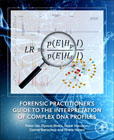
Forensic Practitioners Guide to the Interpretation of Complex DNA Profiles
Gill, Peter
Benschop, Corina
Bleka, Oyvind
Hansson, Oskar
Haned, Hinda
Over the past twenty years, there's been a gradual shift in the way forensic scientists approach the evaluation of DNA profiling evidence that is taken to court. Many laboratories are now adopting 'probabilistic genotyping' to interpret complex DNA mixtures. However, current practice is very diverse, where a whole range of technologies are used to interpret DNA profiles and the software approaches advocated are commonly used throughout the world. The Forensic Practitioner's Guide to the Interpretation of Complex DNA Profiles places the main concepts of DNA profiling into context and fills a niche that is unoccupied in current literature. The book begins with an introduction to basic forensic genetics, covering a brief historical description of the development and harmonization of STR markers and national DNA databases. The laws of statistics are described, along with the likelihood ratio based on Hardy-Weinberg equilibrium and alternative models considering sub-structuring and relatedness. The historical development of low template analysis, theory and practice, is also described, so the reader has a full understanding of rationale and progression. The authors have been at the forefront of the revolution, having made substantial contributions to theory and practice over the past two decades. All methods described are open-source and freely available, supported by sets of test-data. This book is written primarily for the biologist with little or no statistical training. However, sufficient information will also be provided for the experienced statistician. Consequently, the book appeals to a diverse audience. Covers short tandem repeat (STR) analysis, including database searching and massive parallel sequencing (both STRs and SNPs)Encourages dissemination and understanding of probabilistic genotyping by including practical examples of varying complexityWritten by authors intimately involved with software development, training at international workshops and reporting cases worldwide using the methods described in this book INDICE: 1. Forensic Genetics - the basics2. Empirical characterisation of DNA profiles3. Allele drop-out and low template DNA4. Probabilistic genotyping models Development of drop-out and drop-in theory towards5. A qualitative model: LRmix Studio6. EuroForMix7. Validation and comparative studies8. Implementation of EuroForMix in other software9. Defining guidelines for using probabilistic genotyping software in forensic casework10. Investigative expert systems and database searching11. Application to Massive Parallel Sequencing Extending mixture theory to SNPs and12. Interpretation of evidence, propositions and statement writing
- ISBN: 978-0-12-820562-4
- Editorial: Academic Press
- Encuadernacion: Rústica
- Páginas: 500
- Fecha Publicación: 01/09/2020
- Nº Volúmenes: 1
- Idioma: Inglés
